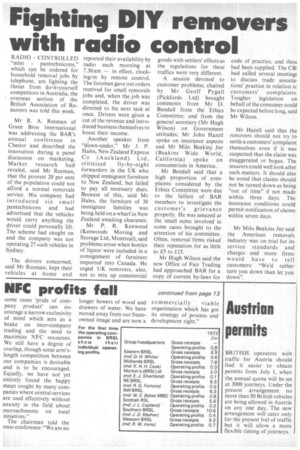Fighting DIY removers with radio control
Page 19

If you've noticed an error in this article please click here to report it so we can fix it.
RADIO CONTROLLED "mini pantechnicons," which can be ordered for household removal jobs by telephone, are fighting the threat from do-it-yourself competitors in Australia, the overseas section of the British Association of Removers was told this week.
Mr R. A. Reeman of Grace Bros International was addressing the BAR's annual conference in Chester and described the innovation during a panel discussion on marketing. Market research had revaled, said Mr Reeman, that the poorest 20 per cent of the population could not afford a normal removals service. His company had introduced six small pantechnicons and had advertised that the vehicles would carry anything the driver could personally lift. The scheme had caught on and the company was not operating 27 such vehicles in Sydney.
The drivers concerned, said Mr Reeman, kept their vehicles at home and reported their availability by radio each morning at 7.30am — in effect, clocking-in by remote control. The foreman gave out orders received for small removals jobs and, when the job was completed, the driver was directed to his next task at once. Drivers were given a cut of the revenue and introduced business themselves to boost their income.
Another speaker from "down-under," Mr J. P. Hales, New Zealand Express Co (Auckland) Ltd, criticized fly-by-night forwarders in the UK who shipped immigrant furniture to New Zealand, but failed to pay all necessary dues. Because of this, said Mr Hales, the furniture of 30 immigrant families was being held on a wharf in New Zealand awaiting clearance.
Mr P. R. Kenwood (Kenwoods Moving and Storage Ltd, Montreal), said problems arose when bottles of liquor were included in a consignment of furniture imported into Canada. He urged UK removers, also, not to mix up commercial goods with settlers' effects as the regulations for these traffics were very different.
A session devoted to customer problems, chaired by Mr Geoff Pygall (Pickfords Ltd) brought comments from Mr D. Bundall from the Ethics Committee; and from the general secretary (Mr Hugh Wilson) on Government attitudes; Mr John Hazell spoke on insurance aspects and Mr Milo Beakins Jnr (Beakins Wide World, California) spoke on consumerism in America.
Mr Bendall said that a high proportion of complaints considered by the Ethics Committee were due to the failure of BAR members to investigate the customer's grievance properly. He was amazed at the small sums involved in some cases brought to the attention of his committee. Often, removal firms risked their reputation for as little as £5 to £15.
Mr Hugh Wilson said the new Office of Fair Trading had approached BAR for a copy of current by-laws for code of practice, and them had been supplied. The CBI had called several meeting5 to discuss trade associations' practice in relation tc customers' complaints. Tougher legislation on behalf of the consumer could be expected before long, said Mr Wilson.
Mr Hazell said that the removers should not try to settle a customers' complaint themselves even if it was suspected that the claim was exaggerated or bogus. The insurers could well look after such matters. It should also be noted that claims should not be turned down as being "out of time" if not made within three days. The insurance conditions could permit notification of claims within seven days.
Mr Milo Beakins Jnr said the American removals industry was on trial for its service standards and charges and more firms would have to tell customers: "We'd rather turn you down than let you down".








































































































